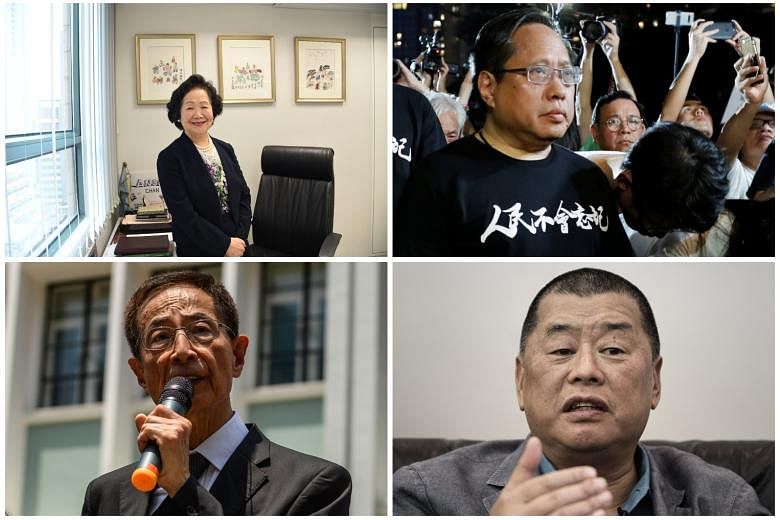HONG KONG • Four senior Hong Kong democrats have found themselves labelled by Chinese state media as a new "Gang of Four", as Beijing seeks to assign blame for the largely leaderless protest movement rocking the city.
A string of state media editorials have compared the long-time opposition figures - former chief secretary Anson Chan, former Democratic Party chief Albert Ho, Apple Daily founder Jimmy Lai and Democratic Party founder Martin Lee - to the group of Mao Zedong allies prosecuted after his death in 1976.
The media outlets carrying such pieces include the official publication of the Chinese Communist Party's (CCP) highest law enforcement body, the Central Political and Legal Affairs Commission.
An edition of the CCP's newspaper People's Daily aimed at overseas audience called the four "secretive middlemen and modern traitors".
"Places and nails have been saved for them on shame pole of history," the commentary said.
The choice of targets underscores Beijing's struggle to get its hands around the loose coalition of opposition groups that have orchestrated 11 straight weekends of flash-mob sit-ins, worker strikes, police station sieges and historically large marches.
While Mrs Chan, Mr Ho and Mr Lee remain active commentators and Mr Lai's media network backs the protests, it has been years since any has been seen as a central opposition figure.
"It is really a joke. I don't know on what basis do they elevate me to that level," Mr Ho told Bloomberg News. "Probably, they are just finding somebody to blame for the protests."
Mr Mark Simon, group director of the media company Mr Lai founded, Next Digital, said that Mr Lai was not concerned about such Communist Party labels.
The editorials represent some of the most direct personal attacks levelled as China attempts to discredit the protest movement.
While Chinese officials have compared the protests to terrorism and a "colour revolution", they have generally stopped short of blaming particular individuals for the unrest.
The Gang of Four moniker was first used to describe Mao's wife Jiang Qing and three other figures who came to power during the 1966 to 1976 Cultural Revolution, which was a period of political upheaval. "The Gang of Four conspired to usurp the party and seize power," the People's Daily said in November 1976.
State media also applied it to a similar group of Hong Kong officials in 2013, with local Catholic leader Joseph Zen standing in for Mr Ho.
Naming the new Gang of Four in Hong Kong dovetailed with Beijing's effort to attribute the protests to the "black hand" of American influence. As senior members of the pro-democracy movement's establishment wing, they are often sought out by American diplomats, officials and journalists for insights into the city's politics.
The piece published under the Political and Legal Affairs Commission, which is led by Politburo member and former public security chief Guo Shengkun, refers to Mr Lai as a "running dog" of the United States and a conduit for "black money".
The editorial described Mr Lee, who sat on the committee that helped write Hong Kong's Basic Law before its return to China, as the "father of Hong Kong independence".
Mr Lee said on Monday: "So many people take to the streets, but the government can't say it is their fault. So, they put the blame on the Gang of Four, together with foreigners, to narrow it down and justify their position. It is such a convenient excuse."










